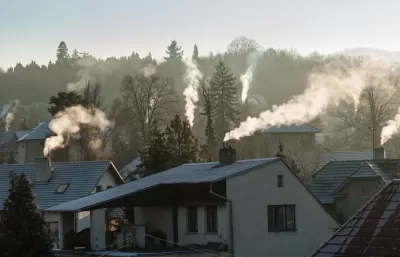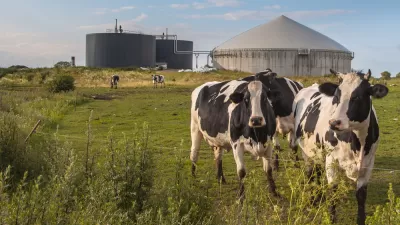The program is voluntary, providing incentives to replace older, uncertified wood stoves for cleaner replacements or alternatives. In addition to decreasing air pollution, it reduces emissions of a "super climate pollutant," black carbon.

The new program is the result of legislation by Sen. Ricardo Lara (D-Bell Gardens) signed by Gov. Jerry Brown on Oct. 11. Reducing wood smoke is essentially an environmental two-fer, simultaneously decreasing air pollution and mitigating climate change.
"The smoke from wood burning is made up of a complex mixture of gases and fine particles (also called particle pollution, particulate matter, or PM)," according to the U.S. Environmental Protection Agency.
Short-term exposures to particles (hours or days) can aggravate lung disease, causing asthma attacks and acute bronchitis, and may also increase susceptibility to respiratory infections. Long-term exposures (months or years) have been associated with problems such as reduced lung function and the development of chronic bronchitis—and even premature death.
"Changing out one dirty, inefficient wood stove is equivalent to taking five old diesel buses off the road, according to the U.S. Environmental Protection Agency," state's Sen. Lara's press release.
Black carbon = super pollutant
Wood smoke from home heaters will be the biggest source of human-caused black carbon by 2030, according to the California Air Resources Board," notes the SB 563 press release.
According to the Sept. 8 analysis, "Black carbon has a global warming potential 3200 times that of CO2 on a 20-year time scale." A Geophysical Research study in 2013 determined that it was the second most important heat-trapping pollutant after carbon dioxide.
SB 563 helps meet one of the goals set in Senator Lara's Super Pollutant Reduction Act of 2016. "Under Senate Bill 1383, California set targets to reduce methane, tropospheric ozone, hydrofluorocarbons and black carbon emissions, giving the state Air Resources Board until Jan. 1, 2018, to determine how those goals will be met," write Melody Gutierrez and Kurtis Alexander for the San Francisco Chronicle on September 20, 2016.
The measure requires a 50 percent reduction by 2030 in human-caused black carbon emissions compared with 2013 levels. Black carbon emerges primarily from wildfires, but also emissions from wood-burning fireplaces and diesel-fueled engines.
Funding for the wood stove replacements will come from the Greenhouse Gas Reduction Fund, i.e., revenues from cap-and-trade. CARB would direct funds to the regional air quality management districts and air pollution control districts, many of which already have operate replacement programs. According to the Sept. 8 legislative analysis of the bill, "these programs are typically oversubscribed and demand exceeds available funds."
Hat tip: David E. Garcia, Calif. State Senate Environmental Quality Committee consultant.

Planetizen Federal Action Tracker
A weekly monitor of how Trump’s orders and actions are impacting planners and planning in America.

Restaurant Patios Were a Pandemic Win — Why Were They so Hard to Keep?
Social distancing requirements and changes in travel patterns prompted cities to pilot new uses for street and sidewalk space. Then it got complicated.

Map: Where Senate Republicans Want to Sell Your Public Lands
For public land advocates, the Senate Republicans’ proposal to sell millions of acres of public land in the West is “the biggest fight of their careers.”

Maui's Vacation Rental Debate Turns Ugly
Verbal attacks, misinformation campaigns and fistfights plague a high-stakes debate to convert thousands of vacation rentals into long-term housing.

San Francisco Suspends Traffic Calming Amidst Record Deaths
Citing “a challenging fiscal landscape,” the city will cease the program on the heels of 42 traffic deaths, including 24 pedestrians.

California Homeless Arrests, Citations Spike After Ruling
An investigation reveals that anti-homeless actions increased up to 500% after Grants Pass v. Johnson — even in cities claiming no policy change.
Urban Design for Planners 1: Software Tools
This six-course series explores essential urban design concepts using open source software and equips planners with the tools they need to participate fully in the urban design process.
Planning for Universal Design
Learn the tools for implementing Universal Design in planning regulations.
Heyer Gruel & Associates PA
JM Goldson LLC
Custer County Colorado
City of Camden Redevelopment Agency
City of Astoria
Transportation Research & Education Center (TREC) at Portland State University
Camden Redevelopment Agency
City of Claremont
Municipality of Princeton (NJ)




























